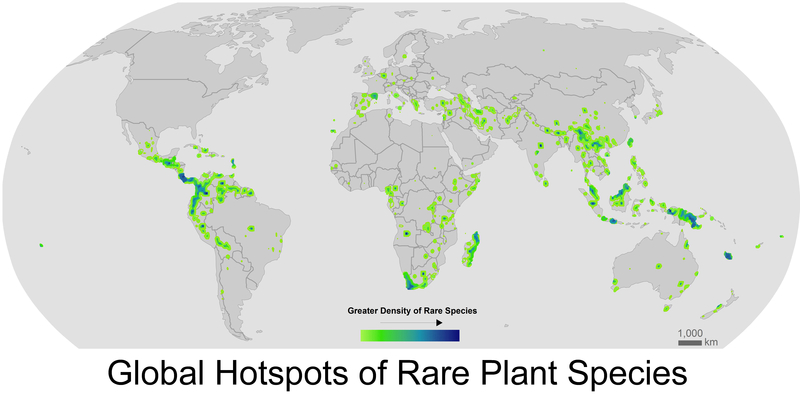The earth harbors a wealth of plant species. However, scientists have found out that 40% of them are very rare and at risk due to climate change and human activity.
A group of 35 researchers, including the lead author Brian Enquist, Professor of Ecology and Evolutionary Biology at the University of Arizona, spent ten years putting together the most comprehensive database of plant occurrences, the integrated Botanical Information and Ecology Network (BIEN), with more than 200 million observations. In total, they recorded about 435,000 different plant species, the highest number of plant species ever recorded.
“That’s an important number to have, but it’s also just bookkeeping. What we really wanted to understand is the nature of that diversity and what will happen to this diversity in the future,” Enquist said. “Some species are found everywhere – they’re like the Starbucks of plant species. But others are very rare – think a small standalone café.”
In total, 36.5% of all plants were very rare, meaning that they were observed five times or fewer. The researchers controlled for sampling and taxonomic bias and found that the results still held. It turns out that rarity is common for plants.

There are certain regions in the world that are hot spots for rare plant species, such as the Northern Andes in South America, Costa Rica, South Africa, Madagascar and Southeast Asia. These regions support such a high diversity of rare species because they have had a stable climate for a long period of time.
However, due to climate change, these once-stable climates are now changing as rapidly as the rest of the world. Therefore, many of these species are expected to go extinct. In particular, the southern Andes and Southeast Asia are predicted to experience the largest decreases. Not to mention that these regions will face high human impact in terms of habitat destruction.
“We learned that in many of these regions, there’s increasing human activity such as agriculture, cities and towns, land use and clearing. So that’s not exactly the best of news,” Enquist said. “If nothing is done, this all indicates that there will be a significant reduction in diversity – mainly in rare species – because their low numbers make them more prone to extinction.”
Now that we know more definitively where the rarest plants in the world reside, we can plan strategically how to protect them.
Reference: Enquist et al. The commonness of rarity: Global and future distribution of rarity across land plants. Science Advances 27 Nov 2019 : eaaz0414.









